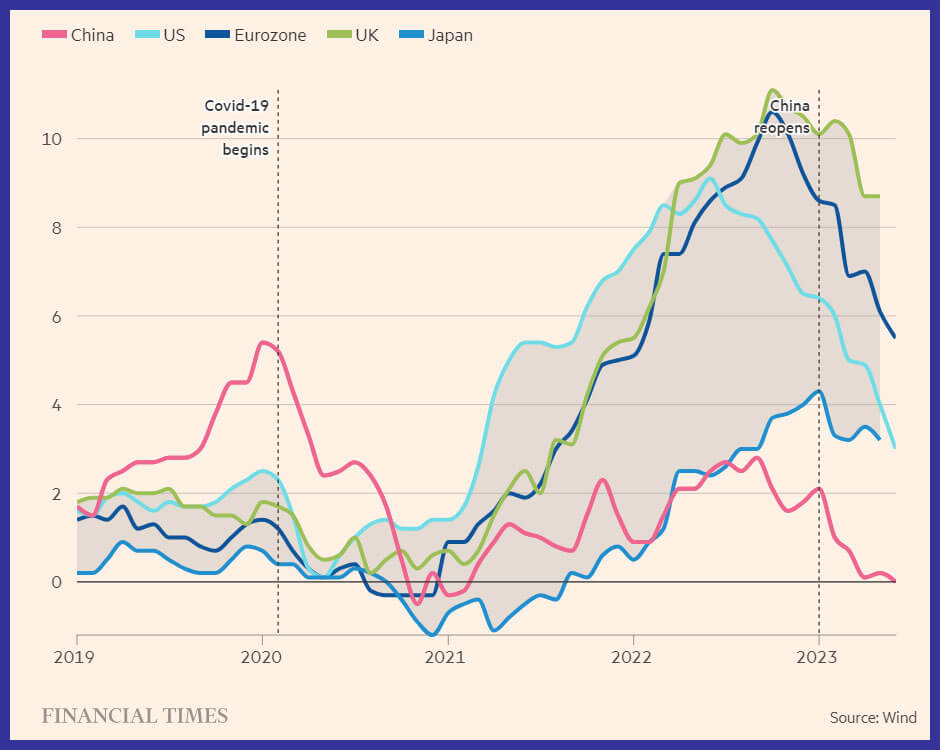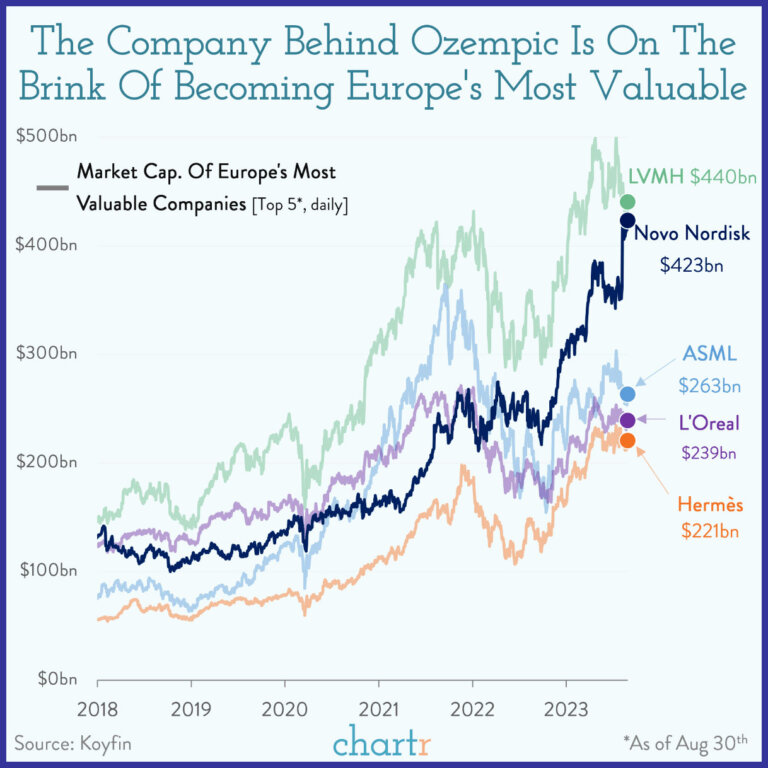Making sense of the markets this week: September 10, 2023
BoC holds rates at 5%, Couche-Tard has a mixed quarter, China battles deflation and Danish pharma company grows by helping people shrink.
Advertisement
BoC holds rates at 5%, Couche-Tard has a mixed quarter, China battles deflation and Danish pharma company grows by helping people shrink.

Kyle Prevost, editor of Million Dollar Journey and founder of the Canadian Financial Summit, shares financial headlines and offers context for Canadian investors.
The Bank of Canada (BoC) announced on Wednesday that it would hold interest rates at 5%, at least until the next decision date, October 25.
Given the surprising news of negative gross domestic product (GDP) numbers and slightly higher unemployment rates last month, the decision not to raise rates had been widely forecast.
The BoC recognized these realities by saying, “The Canadian economy has entered a period of weaker growth.”
Interestingly though, the Canadian central bank was still cautious with its overall messaging, communicating to investors that they were, “prepared to increase the policy interest rate further if needed.” Of course, one would imagine that a central bank is always ready to increase the interest rate “if needed”—as that’s essentially the job description.
wpDataChart with provided ID not found!Somewhat concerning, though, several Canadian politicians have taken to criticizing the BoC’s recent inflation-fighting efforts, including Finance Minister Chrystia Freeland, Ontario Premier Doug Ford and British Columbia Premier David Eby. Economists are nearly universal in their support of independent central banks. To see politicians of all stripes join Conservative Party Leader Pierre Poilievre in trash talking the BoC is really a sad state of affairs. No doubt, it will contribute to the misinformation that’s prevalent for mandating central banks.
Yesterday, I wrote to the Governor of the Bank of Canada echoing Premier @Dave_Eby’s call to stop raising interest rates. Ontario families and businesses are struggling to make ends meet and cannot afford the crushing costs brought about by repeated interest rate hikes. pic.twitter.com/cdVE9IQzmH
— Doug Ford (@fordnation) September 4, 2023
While we can understand the plays of politicians trying to get reelected, we wish they would help educate Canadians in the difficult trade-offs that come with interest-rate decisions. Runaway inflation is a major threat to the Canadian standard of living. (Just ask the Turks or Argentianians!) While the fix for high inflation is not even close to being worse than the disease, that doesn’t mean containing it is fun nor easy. When the central bank announces things like “We need to dampen demand,” or “flatten the demand curve,” it is essentially saying, “We’re going to raise interest rates until people feel pain and quit spending money.” That medicine tastes awful—but it’s tough and it works. Politicians should give the space needed to make sure this medicine goes down—not try to score cheap political points.
The interest rate hold was widely expected, and consequently, the Canadian dollar was essentially unchanged on the news.
While interest rate cuts can’t come soon enough for those suffering from variable rate increases or who see their mortgage terms maturing in the near future, the BoC didn’t see any light at the end of the tunnel—or at least it didn’t tell Canadians what it saw. Instead, the central bank appears to be very careful about managing expectations.
On the savers’ side of the interest rate equation, though, now might be the time to start to lock in some generous fixed-income rates as you can still snag 5-year GICs for more than 5%. You can read my comparison of Canada’s best short-term investments at MillionDollarJourney.ca for more information.
While high inflation is painful, it’s not the worst-case economic scenario.
As I pointed out last year, inflation isn’t the big boss at the end of the economic video game.
The economic bogeyman is actually deflation.
Ever since the Great Depression, experts have been worried about a repeat of the deflationary spiral that led to awful outcomes for much of the world.
On the surface, the idea of falling prices doesn’t sound too bad.
The problem is that when prices start to fall, people expect them to keep falling. Once Chinese consumers expect prices to fall, then they don’t want to buy anything. After all, if things will be cheaper next year, it’s better to wait until buying them, right? Of course, as prices fall businesses make less money and have to furlough employees. Once there are fewer job openings, they will have less money to spend, which in turn lowers demand for goods and services and then… well, you see why it’s called a spiral, right? So, at a time when much of the world is addressing rapidly increasing prices, China has the opposite (and potentially more serious) problem.

The fear of deflationary spiral is likely why China’s government decided to intervene in its housing markets this week, as well as loosen its overall monetary policy.
It appears China is losing the fight for consumers’ hearts and minds at the moment. Over the past year, Chinese households have decided they would rather be cautious, and save rather than spend money. Personal deposits have hit record numbers, despite rapidly loosening monetary policy.
Adam Posen, president of the Peterson Institute for International Economics, recently stated, “The average Chinese consumer and small business has been lastingly spooked by the way that the zero-COVID system was run in China. […] People seem to be moving into more liquid assets which is usually a sign of fear, it’s self-insurance.” He went on to add, “It’s quite shocking to see just how weak the rebound is in China.”
The current episode of the fantastic podcast Drum Tower (from the team at The Economist) gave an excellent accounting of this consumer reluctance issue.
The average Chinese consumer is holding back on spending and it might be partially attributed to the extreme zero-COVID actions taken in the country. But, it might also be due to seeing their housing-based investments evaporate in value. Real estate accounts for nearly 30% of GDP in China and is by far the most common domestic investment option, with nearly 70% of Chinese household wealth sunk into that asset class.
With all of the extremely negative news headlines about real estate developers Evergrande and Country Market, it may come as no surprise that, after Chinese real estate’s worst year on record, the sector has further declined by about 8% in 2023.
It’s also worth considering that Chinese youth unemployment recently got so high that the country recently stopped keeping track!
Hong Hao, GROW Investment Group’s chief economist said, “I think we are on the verge of deflation. Now it’s the time to act to stem the deflationary pressure.”
Given China’s important place in the world economy, this trend bears close watching. It’s of particular interest to the Canadian economy, due to our reliance on selling raw materials.
While our 3%-to-4% inflation rates are certainly not ideal, I’d bet there are many Chinese central bankers who would be willing to trade places with their Canadian counterparts at the moment.
Quebec-headquartered convenience store giant Alimentation Couche-Tard (ATD/TSX) presented mixed news in its earnings report on Thursday. Note, ATD presents earnings and revenues in U.S. dollars.
Earnings per share came in at $0.85 (versus $0.79 predicted) and revenues had a slight miss at $15.62 billion (versus $16.12 billion predicted).
While both earnings and revenues were down in year-over-year comparisons, this was mostly due to lowering fuel prices, and the overall revenue trend for the company remains strong.
Shares of ATD were down about 1.5% on Thursday after the earnings report was released.
The company highlighted that it is continuing to battle inflationary pressures. Additionally, it stated that its acquisition of about 2,200 service stations from the French company TotalEnergies SE that was expected to close in 2023.
Interestingly, this quarter ATD also launched a loyalty program called Inner Circle in Florida. With 2.7 million customers already signed up, it looks like it could be key to increasing long-term customer “stickiness.”
You can read more about why I’m such a big fan of ATD by checking out my article on investing in Canadian retail stocks at MillionDollarJourney.
Danish pharmaceutical company Novo Nordisk (NOVO-B/CPH), maker of uber-popular weight-loss drugs Ozempic and Wegovy, is now the largest company in Europe, by market capitalization, at close to USD$430 billion.

Here’s a few facts to help you put Novo’s rise into context:
With all the negative news headlines it can be easy to skim over incredible innovations. You may not want to let the negative noise drown out the increased value that top-notch talent is creating at companies around the world. Up to you.
Share this article Share on Facebook Share on Twitter Share on Linkedin Share on Reddit Share on Email
hardly an impartial piece…bought and paid for by the Federal government
Runaway inflation? What is causing rising inflation more than a useless carbon tax AND higher interest rates? Maybe it is time the BoC woke up and looked around at what ordinary Canadians are going through!
There is a cost reward result for everything and the cost of rising interest rates are greater than the lack of reward, which throws it back to Ms Freeland to reduce government spending to help reduce inflation.